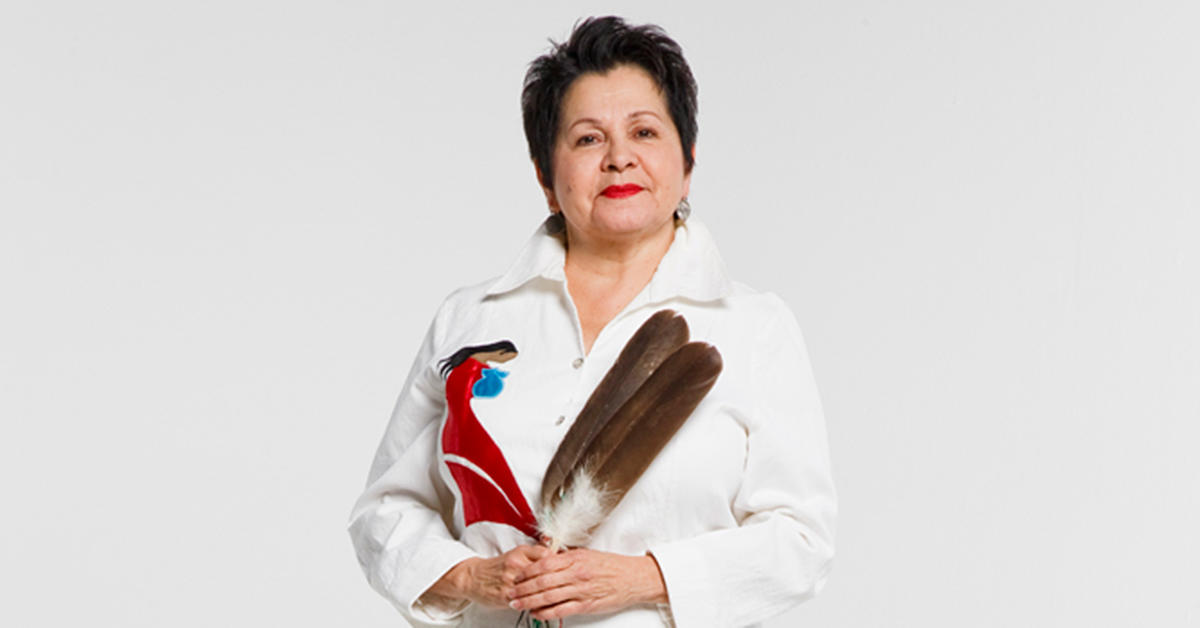The Indspire Awards are some of the most prestigious distinctions the Indigenous community bestows on its own people. On Friday, March 6, three uOttawa alumni were among this year’s recipients, including the University’s first ever elder-in-residence, Claudette Commanda, who was recognized for her work in culture, heritage and spirituality.
An Algonquin Anishinabe from Kitigan Zibi Anishinabeg First Nation, Commanda holds degrees from the uOttawa Faculty of Arts (’93) and the Faculty of Law, Common Law Section (’97). She has dedicated her career to promoting First Nations rights, history and culture.
First ever elder-in-residence
The role of uOttawa elder-in-residence was created by the Faculty of Law in 2017 to ensure that the campus is a safe and welcoming place for Indigenous people, as well as to enrich the university experience.
A devoted and inspiring mentor, Commanda was a natural choice for this role. She has taught throughout the university, including at the Institute of Women’s Studies, Faculty of Law and Faculty of Education, and in the Aboriginal Studies program. She specializes in teaching Native education, First Nations people and history, Indigenous traditions, the experience of First Nations women and decolonization.
In addition to being a trusted adviser and mentor through her work with various government departments, Commanda serves as executive director for the First Nations Confederacy of Cultural Education Centres, a national organization whose purpose is to protect, promote and revitalize First Nations languages and cultures. “The enrichment of community health and self-esteem for First Nations youth depends on the transmission of knowledge from elders to youth,” she says. “This is the paramount reason that the survival of languages and culture is critical.”
Elder Commanda was a survivor and lead plaintiff in the Indian Day School Class Action Settlement, during which she advocated for justice and healing for approximately 140,000 survivors who attended on-reserve federally-run day schools across Canada. During this process she testified how these schools instituted assimilation, and are responsible for abuses, loss of language and culture.
She was also the first First Nations person to be named to the University of Ottawa’s Board of Governors.
uOttawa alumnae inspiring role models
Karen Lawford and Gina Wilson were also recognized by Indspire, for contributions to Indigenous health and work in the public service, respectively.
Lawford, from Lac Seul First Nation, holds a master’s degree (’12) and a PhD (’17) from the Faculty of Social Sciences. She is now an assistant professor in the Department of Gender Studies at Queen’s University and an adjunct research professor in the School of Indigenous and Canadian Studies at Carleton University. She was the first registered midwife and Indigenous midwife in Canada to receive a doctorate and hold a university appointment. She advocates for maternity care that allows community members to give birth in their communities and on the land and has explored the resiliency and resistance of women evacuated from their communities to give birth.
Wilson, from Kitigan Zibi First Nation, graduated from the Faculty of Social Sciences in 1998 and has held senior leadership positions at the Assembly of First Nations, Employment and Social Development Canada, the Privy Council Office, Indian and Northern Affairs Canada, Women and Gender Equality Canada and Public Safety Canada. Through her work with Indian Residential Schools Resolution Canada, Gina was involved in an official apology and the implementation of a settlement agreement for approximately 80,000 survivors of Indian residential schools in Canada.
